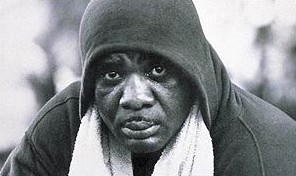 By Mike Dunn – It was the summer of 1968, a turbulent time in our country and a critical time in the career of a heavyweight boxer whose very life seemed to define the word turbulent. Charles “Sonny” Liston was on the comeback trail and was facing his first big test, taking on a pretty tough San Francisco contender named Henry Clark on a Saturday afternoon in front of a national TV audience.
By Mike Dunn – It was the summer of 1968, a turbulent time in our country and a critical time in the career of a heavyweight boxer whose very life seemed to define the word turbulent. Charles “Sonny” Liston was on the comeback trail and was facing his first big test, taking on a pretty tough San Francisco contender named Henry Clark on a Saturday afternoon in front of a national TV audience.
Liston weighed 219 for the fight on July 6 at the fabled Cow Palace in San Francisco and Clark, coming off a majority 10-round decision over scrappy Leotis Martin, weighed 215. Liston looked much the bigger man, though, his weight spread over a broad, powerful 6-foot frame. Liston brought a 41-3 record and a reputation as a deadly puncher and great finisher into the scheduled 10-rounder. Clark, who stood 6-3, brought a more modest 15-3-2 log into the ring but had been in against very stiff competition, including Martin, Zora Folley, Eddie Machen, Manuel Ramos and Roger Rischer. Clark was ranked ninth by Ring Magazine..
It was expected to be a pretty good battle and ABC sent Howard Cosell to broadcast it live for Wide World of Sports.
This was a huge opportunity for Liston and he knew it. The big man had all but disappeared from public view in the wake of his two controversial losses to Muhammad Ali in 1964 and ’65 and was still trying to rehabilitate his shattered image after quitting on the stool in Miami to hand the title to Ali, and then going down in the first round to a “phantom punch” in Ali’s first defense of the crown.
Though he was probably in his late 30s when he launched his comeback, Liston wisely took the patient route back to contender status. After taking a year off following the Lewiston debacle, Sonny went overseas to fight before mostly friendly crowds in Sweden in 1966 and ’67. He scored four straight KO’s over moderately tough opponents in that stretch to at least put himself in position to have a shot at re-entering the rankings.
In 1968, Sonny picked up the pace considerably, fighting again on U.S. turf and staying active. He scored KO’s over Bill McMurray in Reno in March and over Bill Joiner at the Olympic Auditorium in L.A. in May to earn his TV showdown with Clark.
Now it was July 6 and Liston was in the national spotlight again. The cameras were kind to Sonny on this day. He looked to be in peak form – or as close to peak form as he could get at that point – when the American viewing audience laid eyes on him just prior to the start of the bout. It looked very much indeed like the same Sonny, brooding and intimidating, who stared down Clark while the referee gave instructions in center ring.
Liston desperately needed a good showing in this setting and he gave one. In possibly the best performance of the post-title phase of his career, Sonny controlled the fight with Clark from the start, using the jolting jab that he was famous for to keep Clark on the defensive.
I was 13 when the fight took place and remember watching it live on a black-and-white set in my family home in Philadelphia. I was fascinated by Liston, whom I was watching for the first time, and marveled at his physique and heavy punching.
Sonny dominated until ref Frankie Carter finally halted things late in the seventh round, a good stoppage. What I didn’t remember from my youth, though, was Clark’s gameness. I just watched it again recently on youtube and was very impressed with Clark’s resilience and toughness in the face of Liston’s brutal assault.
Clark was stubborn in defeat, remaining on his feet in spite of being nailed several times by severe Liston hooks and a right cross that knocked him halfway across the ring just before the bout was stopped. But there was no question the real story of the day was Sonny’s re-emergence as a legitimate contender. Liston had trained hard for this opportunity and he didn’t blow it. He was in almost giddy mood after the fight – if Liston’s mood could ever be characterized as giddy – and gave the bemused Cosell one of his famous quotes: “When guys get fresh, they get sassy.”
Immediately after Sonny’s remark, Cosell laughed and said to him, “You’re feeling pretty chipper, aren’t you?”
Liston certainly seemed to be on top of the world. He said a fight with Jerry Quarry was in the works (thought it never took place) and Sonny was hoping to use that as a springboard for a fight with then-World Boxing Association heavyweight champ Jimmy Ellis. The future looked very promising.
Who could foresee that in just a year-and-a-half, Sonny would suffer a devastating KO loss to Leotis Martin, also on Wide World of Sports? And who could foresee that a year after that, Sonny would be found dead by his wife Geraldine in Las Vegas?
Sonny went from the post-fight glory of the summer of 1968 to faded contender in December of 1969 to late champion in December of 1970. It all happened so fast. He had a turbulent life indeed.
Mike Dunn is a writer and boxing historian living in Lake City, Mich.